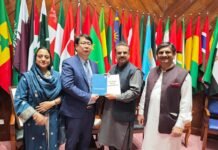Geneva, 2 February 2023 (TDI): According to a report issued by the United Nations Office of Drugs and Crime (UNODC) half a million people in the Sahel region are killed due to substandard medicines.
The medicines which are trafficked and smuggled in the Sahel region are substandard and mostly made up of fake ingredients. These medicines are causing half a million deaths in the Sahel region every year.
Lack of Health Care
The lack of healthcare facilities is the major reason behind this issue. This provides a space to opportunists groups and individuals for the provision of trafficking medical products in the Sahel region.
That is triggering deadly outcomes. There are terrorist groups involved here and the nature of the threat is transnational. According to UNODC 267,000 deaths per year is the norm in Sub-Saharan Africa due to substandard antimalarial medicines.
Additionally, up to 169,271 people died due to falsified and substandard antibiotics used to treat severe pneumonia in children. The trafficking of these medicines and medical products is also taking a direct economic toll on affected countries.
The World Health Organization (WHO) estimated that caring for people who have used falsified or substandard medical products for malaria treatment in sub-Saharan Africa costs between $12 million to $44.7 million every year.
The international agencies seized 605 tons of medicines and medical products from West Africa. This happened between 2017 to 2021. Generally, these products travel through mainstream international trade channels, mainly by sea.
These products are illegally diverted from legal supply chains of major exporting countries to the Sahel region, including China, Belgium, France, and India. Others are manufactured in neighboring countries.
Smugglers used to move these medical products by bus, cars, and trucks to the Sahel, following existing trafficking routes, to avoid border controls.
Terrorist groups and non-State armed groups are commonly associated with medical product trafficking in the Sahel, but, their involvement is limited.
These groups levy taxes in areas they control and also abuse drugs for their personal use. An Al-Qaeda affiliate documented that terrorist groups in Cote d’Ivoire and Nigeria use medicines and medical products for non-medical purposes.
Similarly, UNODC reports that there is a variety of actors that are involved in the illicit medical products trade. These products are then distributed to pharmaceutical company employees, public officials, law enforcement officers, health agency workers, and street vendors.
The African Union (AU) established the African Medicines Regulatory Harmonization initiative in 2009 to improve access to safe, and affordable medicine.
The effort is part of its Framework on Pharmaceutical Manufacturing Plan for Africa. Moreover, all Sahel countries but Mauritania have ratified a treaty for the establishment of the African Medicines Agency.
According to UNODC, there is a need to introduce or revise legislation to prevent all related offenses, such as smuggling, money laundering, and corruption.
Iqra is a research scholar. She writes on various platforms. She is the author of two books. Her research interest includes politics, International relations, diplomacy, peace, and conflict studies, public administration, sociology and history.








